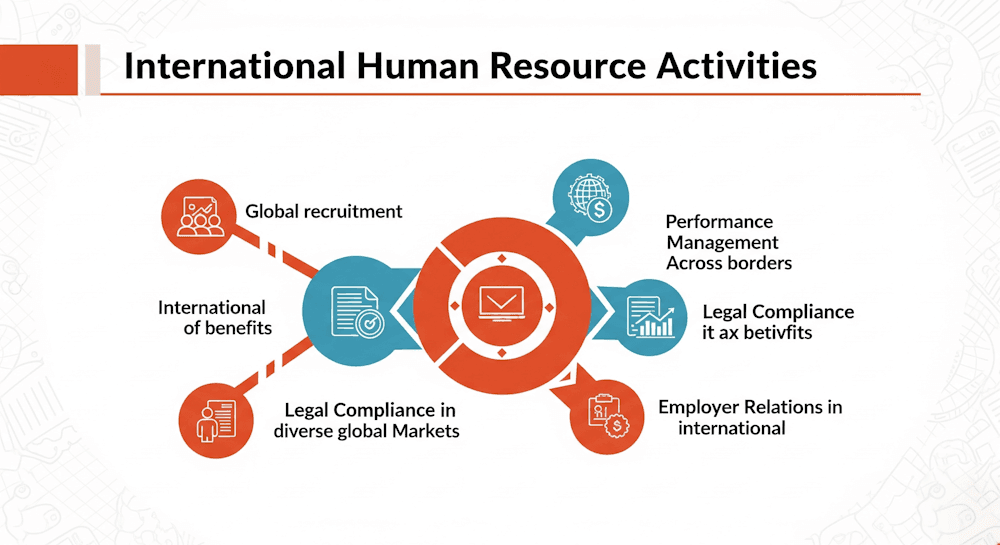Role of Human Resources in International Business
As the success of domestic business depends on its human resources, the success of a multinational company depends on international human resource management. Human resource managers are essentially the people managers of any business organization and are responsible for managing a wide range of employees.
The HR manager in a multinational company, especially one with divisions or subsidiaries in foreign countries, holds all the usual HR responsibilities plus several additional ones unique to offshore operations. They are essentially responsible for international human resource management.
International human resource management covers various activities related to a business organization’s employees and contractors. The first and most important is staffing—whether it involves in-house employees or outsourced contractors. Other key responsibilities include:
- Recruiting and training employees
- Monitoring performance and addressing any performance issues
- Ensuring compliance with relevant labor laws and regulations
- Managing employee compensation and benefits
- Maintaining accurate employee records
- Establishing personnel policies and practices
The primary difference between domestic and international human resource management lies in the added knowledge and responsibilities required for handling foreign operations. These typically include:
- Language differences in non-English-speaking regions
- Understanding and complying with local and national laws
- Dealing with currency exchange rates
- Adapting to varying employee expectations around careers and benefits
- Navigating business etiquette and ethical norms across cultures
IHRM professionals must fully understand these differences and be prepared to educate others in the company to avoid misunderstandings or cultural faux pas in international interactions.
Significance of Human Resources in International Business
Human Resources – Valuable
For any resource to offer a sustainable competitive advantage, it must be valuable. Labor demand varies from one firm to another and even more drastically across countries, due to differences in capital availability, labor practices, and social/cultural norms. Likewise, labor supply varies due to differences in hygiene, health care, nourishment, training, and education.
As competition becomes increasingly global, companies have the opportunity to create significant value through strategic human resource management. To be a source of advantage, HR must have:
- Control
- Access to information
- Awareness
- Recognition
- Proper reward systems
Human Resources – Rare
To be a source of sustainable competitive advantage, resources must also be rare. Skills among humans are not evenly distributed, and specific jobs demand specialized expertise. Such talents are not easy to find.
International firms, however, have access to a wider labor pool, giving them a better chance to find and develop rare and valuable human resources—more so than domestic companies limited to a single labor market.
Human Resources – Inimitable
The inimitability of human resources can come from two factors:
- Causal Ambiguity: This occurs when it’s unclear how a company’s resources contribute to its competitive advantage. For instance, in team-based production, it's difficult to pinpoint which individual’s efforts drove success. This ambiguity makes imitation harder.
- Social Complexity: Competitive advantage can also stem from intricate relationships, trust, and informal networks built over time. These social dynamics are unique and cannot be easily replicated by competitors. In international settings, variations in customs, cultures, religions, and political contexts add further complexity, making imitation nearly impossible.
Human Resources – Non-substitutable
To remain competitive globally, a resource must not have a viable substitute. While it might be possible to temporarily substitute other resources, human resources are difficult to replace over the long term.
Human capabilities can transfer across products, technologies, and markets. With the right training, human resources remain current and adaptable. Even as tools and systems evolve, people—when properly developed—remain irreplaceable.
In Summary:
Human resources are the backbone of international business success. They are not just employees; they are a firm's most valuable, rare, inimitable, and non-substitutable resource. As companies expand globally, the role of HR grows in complexity and significance. Managing people across different cultures, legal systems, and economic conditions is challenging—but when done well, it becomes a powerful source of competitive advantage.






